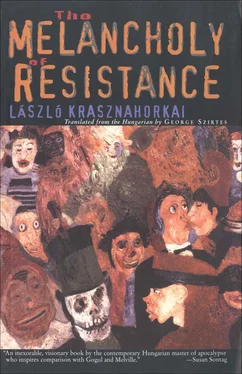László Krasznahorkai
The Melancholy of Resistance
It passes, but it does not pass away
AN EMERGENCY. Introduction
SINCE THE PASSENGER TRAIN CONNECTING THE icebound estates of the southern lowlands, which extend from the banks of the Tisza almost as far as the foot of the Carpathians, had, despite the garbled explanations of a haplessly stumbling guard and the promises of the stationmaster rushing nervously on and off the platform, failed to arrive (‘Well, squire, it seems to have disappeared into thin air again …’ the guard shrugged, pulling a sour face), the only two serviceable old wooden-seated coaches maintained for just such an ‘emergency’ were coupled to an obsolete and unreliable 424, used only as a last resort, and put to work, albeit a good hour and a half late, according to a timetable to which they were not bound and which was only an approximation anyway, so that the locals who were waiting in vain for the eastbound service, and had accepted its delay with what appeared to be a combination of indifference and helpless resignation, might eventually arrive at their destination some fifty kilometres further along the branch line. To tell the truth, none of this really surprised anyone any more since rail travel, like everything else, was subject to the prevailing conditions: all normal expectations went by the board and one’s daily habits were disrupted by a sense of ever-spreading all-consuming chaos which rendered the future unpredictable, the past unrecallable and ordinary life so haphazard that people simply assumed that whatever could be imagined might come to pass, that if there were only one door in a building it would no longer open, that wheat would grow head downwards into the earth not out of it, and that, since one could only note the symptoms of disintegration, the reasons for it remaining unfathomable and inconceivable, there was nothing anyone could do except to get a tenacious grip on anything that was still tangible; which is precisely what people at the village station continued to do when, in hope of taking possession of the essentially limited seating to which they were entitled, they stormed the carriage doors, which being frozen up proved very difficult to open. Mrs Plauf, who happened to be on her way home from one of her customary winter visits to relatives, took full part in the pointless struggle (pointless since, as they soon discovered, no one actually remained standing), and by the time she had shoved aside those who stood in her way and used her tiny frame to hold up the crowd pressing behind her in order to assure herself of a rear-facing window seat, she could no longer distinguish between her sense of indignation at the intolerable jostling she had just endured and a different feeling, oscillating between fury and anguish, occasioned by the awareness that she, with her first-class ticket, which was quite worthless in this stench of garlic sausage blended with the aroma of mixed-fruit brandy and cheap pungent tobacco, surrounded as she was by an almost menacing ring of loud-mouthed, belching ‘common peasants’, would be faced by the acute uncertainty faced by all those engaged in what was in any case the risky business of travelling nowadays, in other words not knowing whether she would arrive home at all. Her sisters, who had lived in complete isolation ever since age had rendered them immobile, would never have forgiven her if she had neglected to pay them her regular early-winter visit and it was only on their account that she refused to abandon this dangerous enterprise even though she was as certain as everyone else that something around her had changed so radically that the wisest course under the circumstances would have been to take no risks at all. To be wise, however, soberly to anticipate what might lie in store, was truly no easy task, for it was as if some vital yet undetectable modification had taken place in the eternally stable composition of the air, in the very remoteness of that hitherto faultless mechanism or unnamed principle — which, it is often remarked, makes the world go round and of which the most imposing evidence is the sheer phenomenon of the world’s existence — which had suddenly lost some of its power, and it was because of this that the troubling knowledge of the probability of danger was in fact less unbearable than the common sense of foreboding that soon anything at all might happen and that this ‘anything’—the law governing its likelihood becoming apparent in the process of disintegration — was leading to greater anxiety than the thought of any personal misfortune, thereby increasingly depriving people of the possibility of coolly appraising the facts. To establish one’s bearings among the ever more frightening events of the past months had become impossible, not only because there was little coherence in the mixture of news, gossip, rumour and personal experience (examples of which might include the sharp and much too early cold snap at the beginning of November, the mysterious family disasters, the rapid succession of railway accidents and those terrifying rumours of gangs of criminal children defacing public monuments in the distant capital, between any of which it was hard to find any rational connection), but also because not one of these items of news meant anything in itself, all seeming to be merely omens of what was referred to by a growing number of people as ‘the coming catastrophe’. Mrs Plauf had even heard that some people had started to talk of peculiar changes in the behaviour of animals, and while this — for the time being at least, though who knows what might happen later — could be dismissed as irresponsible and harmful gossip, one thing was certain, that unlike those to whom this signified a state of utter chaos, Mrs Plauf was convinced that, on the contrary, it was perfectly appropriate in its timing since a respectable person hardly dared set foot outside her house any more, and in a place where a train can disappear ‘just like that’ there was, or so her thoughts ran on, ‘no sense left in anything’. And this was how she prepared herself mentally for the ride home, which was bound to be far less smooth than the outward journey, cushioned as she had then been by her nominal status as a first-class passenger, since, as she pondered nervously, ‘anything might happen on these dreadful branch-lines’ and it was best to steel oneself for the worst; so she sat like one who would happily make herself invisible, straight-backed, her knees schoolgirlishly clamped together, wearing a chilly, somewhat contemptuous expression, among the slowly diminishing huddle of people still tussling for seats, and while she kept a suspicious eye on the terrifying gallery of undefined faces reflected in the window, her feelings swung between anxiety and yearning, thinking now of the ominous distances ahead and now of the warmth of the house she had had to leave behind; those pleasant afternoons with Mrs Mádai and Mrs Nuszbeck, those old Sunday walks along the tree-lined avenue of Friars’ Walk, and finally the soft carpets and delicate furniture of home, that radiantly calm order of carefully tended flowers and all her little possessions, which, as she well knew, was not only an island in a wholly unpredictable world where afternoons and Sundays had become merely a memory but the one refuge and consolation of a lonely woman the orderliness of whose life was calculated to produce peace and calm. Uncomprehendingly, and with a certain degree of envious contempt, she realized that her noisy fellow travellers — most likely coarse peasants from the darkest nooks and corners of distant villages — were quickly adapting themselves even to such straitened circumstances: to them it was as if nothing unusual had happened, everywhere there was the rustling of greaseproof paper being unwrapped and food being doled out, corks were popping, beer-can lids were dropping to the greasy floor, and here and there she could already hear that noise ‘so calculated to offend all one’s finer feelings’ but, in her opinion, ‘perfectly common among common people’ of munching and crunching; and what was more, the party of four directly opposite her, who were among the loudest, had already started dealing a deck of cards — till only she was left, solitary, sitting even more stiffly among the increasingly loud human hubbub, silent, her head determinedly turned to the window, her fur coat protected from the seat by a sheet of newspaper, clutching her clipped handbag to her with such terrified and resolute suspicion that she hardly noticed the engine up ahead, its two red lights probing the frozen darkness, drawing uncertainly out into the winter evening.
Читать дальше












